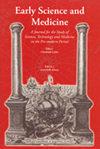Princess Elisabeth’s Cautions and Descartes’ Suppression of the Traité de l’Homme
IF 0.5
2区 哲学
Q3 HISTORY & PHILOSOPHY OF SCIENCE
引用次数: 0
Abstract
Why did Descartes not publish his chief physiology work during his lifetime? Descartes considered that the physiological and medical conclusions that could be drawn from his philosophy were fundamental to his intellectual project, and an apparently complete work was circulating among friends in 1641 but was only published more than a decade after his death, as De Homine (1662) and Traité de l’Homme (1664). This paper argues that Princess Elisabeth’s careful consideration of his physiology raised questions about whether the common interpretation of his philosophy as dualistic was correct, implicating it in some of the most dangerous arguments of his generation. Her questions served as a warning, in a moment when the personal papers and even the liberty of the Frenchman were threatened. Descartes had no interest in becoming a medical Galileo, and listened to the princess, leaving the work unpublished.伊丽莎白公主的告诫与笛卡儿对《人的本性》的压制
为什么笛卡尔生前没有发表他的主要生理学著作?笛卡尔认为,从他的哲学中可以得出的生理学和医学结论是他的智力计划的基础,1641年,一部看似完整的作品在朋友之间流传,但在他去世十多年后才出版,分别是《De Homine》(1662)和《TraitéDe l’Homme》(166 4)。本文认为,伊丽莎白公主对他的生理学的仔细考虑引发了人们对他的哲学二元论的普遍解释是否正确的质疑,并将其纳入了他那一代最危险的争论中。在个人文件甚至法国人的自由受到威胁的时刻,她的问题起到了警告的作用。笛卡尔对成为一名医学伽利略毫无兴趣,他听从了公主的意见,这部作品没有出版。
本文章由计算机程序翻译,如有差异,请以英文原文为准。
求助全文
约1分钟内获得全文
求助全文
来源期刊

Early Science and Medicine
HISTORY & PHILOSOPHY OF SCIENCE-
CiteScore
0.50
自引率
0.00%
发文量
22
审稿时长
>12 weeks
期刊介绍:
Early Science and Medicine (ESM) is a peer-reviewed international journal dedicated to the history of science, medicine and technology from the earliest times through to the end of the eighteenth century. The need to treat in a single journal all aspects of scientific activity and thought to the eighteenth century is due to two factors: to the continued importance of ancient sources throughout the Middle Ages and the early modern period, and to the comparably low degree of specialization and the high degree of disciplinary interdependence characterizing the period before the professionalization of science.
 求助内容:
求助内容: 应助结果提醒方式:
应助结果提醒方式:


